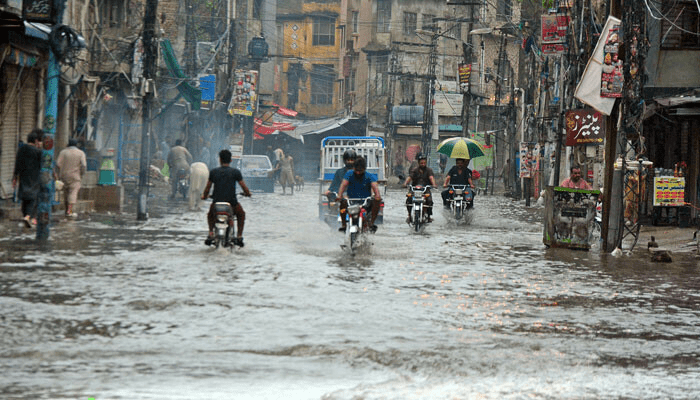By maleeha zahid
The National Disaster Management Authority (NDMA) has issued a warning for widespread heavy rains and possible flash floods across multiple regions of Pakistan starting Sunday, July 6. According to the National Emergencies Operation Center (NEOC), this weather activity is due to a combination of monsoon currents and a strong westerly wave, expected to last until July 10 in most areas and July 12 in northern regions.
Rainfall and thunderstorms are likely to affect several parts of Punjab, including Lahore, Rawalpindi, Faisalabad, and Gujranwala. Meanwhile, Islamabad and surrounding areas may also experience isolated showers and stormy weather. Southern Punjab, including Multan and Bahawalpur, will see low to moderate rain during this period. NDMA has advised citizens to remain alert and avoid unnecessary travel.
In Khyber Pakhtunkhwa, strong thunderstorms and heavy rainfall are expected in districts such as Swat, Dir, Mansehra, Abbottabad, Peshawar, and Kohat. Flash flooding may occur in hilly and low-lying areas, disrupting traffic and causing landslides. Similarly, in Gilgit Baltistan and Azad Jammu and Kashmir, rainfall is expected to be intense, especially at night, increasing the risk of landslides and blocked roads.
Sindh is also bracing for rainy weather, with heavy rainfall likely in Ghotki, Khairpur, Larkana, and Jacobabad. Karachi and nearby cities may experience moderate showers, potentially causing urban flooding and traffic issues. Balochistan will face similar risks, especially in Quetta, Zhob, and Khuzdar, where scattered to heavy rainfall could damage weak structures and interrupt road traffic.
Due to these warnings, NDMA has urged people to take safety precautions, including securing their belongings and avoiding visits to mountainous or flood-prone areas. Tourists are strongly advised to postpone trips to high-altitude regions. Meanwhile, local authorities have been instructed to prepare emergency teams, clean drainage systems, and spread awareness among the public.
NDMA emphasized that early precautions can prevent severe losses. Citizens should stay informed through official weather updates and follow safety guidelines. These measures are vital to minimize the impact of the approaching severe weather conditions.
